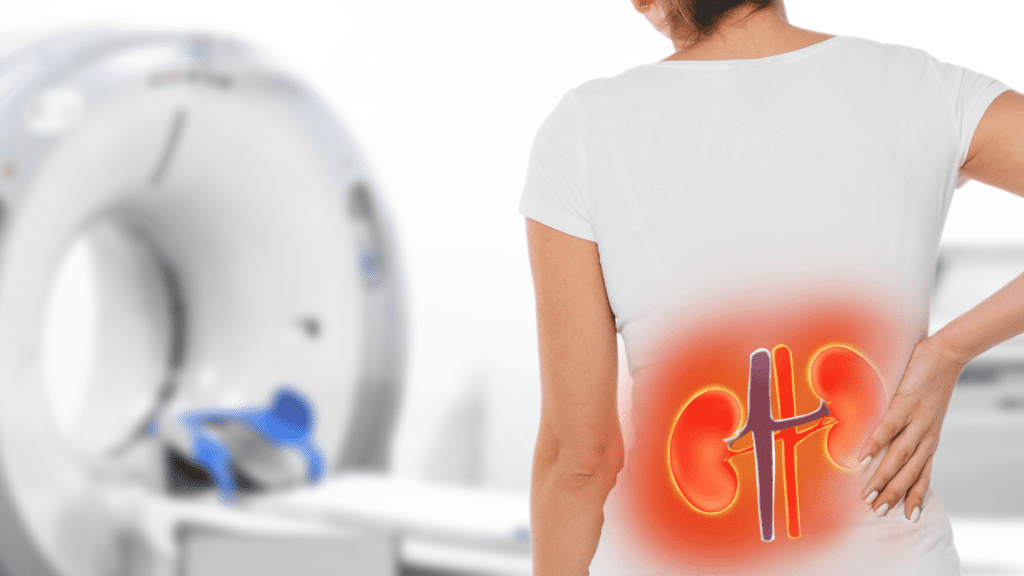
Chronic Kidney Disease (CKD)
Chronic Kidney Disease (CKD) is a long-term condition in which the kidneys gradually lose their ability to filter waste and excess fluids from the blood. This leads to a buildup of toxins in the body, which can affect overall health. CKD can progress over time and, in severe cases, may lead to kidney failure.
Detailed Information
The primary causes of CKD include:
• Diabetes: High blood sugar levels can damage the blood vessels in the kidneys over time, impairing their function.
• High blood pressure (Hypertension): Chronic high blood pressure can cause the blood vessels in the kidneys to narrow and harden, leading to reduced kidney function.
• Glomerulonephritis: Inflammation of the kidney’s filtering units (glomeruli) can lead to CKD.
• Polycystic kidney disease: A genetic condition in which cysts form in the kidneys, potentially leading to kidney failure.
• Obstructions: Conditions like kidney stones, enlarged prostate, or tumors that block urine flow can lead to CKD.
• Other conditions: Autoimmune diseases, infections, and prolonged use of certain medications can also contribute to kidney damage.
In the early stages, CKD may have no obvious symptoms. As the disease progresses, symptoms may include:
• Fatigue and weakness.
• Swelling in the ankles, feet, or around the eyes.
• Decreased urine output or changes in urine appearance.
• Shortness of breath.
• Nausea and vomiting.
• Loss of appetite.
• High blood pressure.
• Itchy skin or rashes.
• Difficulty concentrating or confusion.
While CKD cannot always be prevented, certain lifestyle changes can help reduce the risk:
• Control blood sugar levels: Proper management of diabetes through diet, exercise, and medications.
• Maintain healthy blood pressure: Regular monitoring and lifestyle changes (e.g., reducing salt intake, regular exercise).
• Stay hydrated: Drink plenty of water to support kidney function.
• Avoid smoking and excessive alcohol: Both can worsen kidney health.
• Healthy diet: A balanced diet low in salt, processed foods, and rich in fruits and vegetables.
• Regular check-ups: Early detection through routine kidney function tests can help prevent progression.
While CKD cannot be cured, it can be managed to slow its progression and prevent complications:
• Medications: To control underlying conditions like hypertension, diabetes, and high cholesterol.
• Dietary changes: A kidney-friendly diet may be recommended, often low in salt, protein, and potassium, depending on kidney function.
• Dialysis: In advanced stages of CKD, dialysis may be required to help remove waste and excess fluid from the blood.
• Kidney transplant: In cases of end-stage kidney failure, a kidney transplant may be considered as a treatment option.
Book Your
Consultation Now
Schedule an appointment with the leading uro-oncologist in Bangalore, Dr. Anil
Kumar T. Benefit from expert care and advanced treatment options for all your
urological needs, delivered with a patient-centered approach.

Book Your Consultation Now
Schedule an appointment with the leading uro-oncologist in Bangalore, Dr. Anil
Kumar T. Benefit from expert care and advanced treatment options for all your
urological needs, delivered with a patient-centered approach.

Resolve Your Queries
Answers to the most common inquiries about urological conditions, treatments, and patient care. Designed to offer quick guidance and help you better understand, ensuring you feel informed and confident in your healthcare decisions.
Still have queries about Urology & Uro Oncology? Hit the button below.
Chronic Kidney Disease (CKD) is a long-term condition where the kidneys gradually lose their ability to filter waste and excess fluids from the blood. It can progress to advanced stages, potentially requiring dialysis or a kidney transplant.
The leading causes of CKD include diabetes, high blood pressure, glomerulonephritis (kidney inflammation), and prolonged use of certain medications. Other factors include genetic disorders and recurrent kidney infections.
In the early stages, CKD may have no symptoms. As the disease progresses, symptoms may include fatigue, swelling in the legs and ankles, reduced urine output, nausea, difficulty concentrating, and high blood pressure.
CKD is diagnosed through blood tests (to measure creatinine and eGFR), urine tests, and imaging studies. Management focuses on slowing the disease’s progression through lifestyle changes, medications, controlling underlying conditions, and regular monitoring.
Dr. Anil Kumar T is a trusted urologist with extensive experience in managing CKD. His tailored treatment plans and compassionate care help patients maintain their kidney function and improve quality of life. Book an appointment with Dr. Anil Kumar T for expert advice and comprehensive CKD management.
Visit Us
Zymus Hospital Address
No.1, K NO. 92, Nanjappa Complex, Kanakapura Rd, Raghuvanahalli, Bangalore City Municipal Corporation Layout, Bengaluru, Karnataka 560062
Menu
Quick Links
Copyright © 2024. Dr Anil Kumar T

